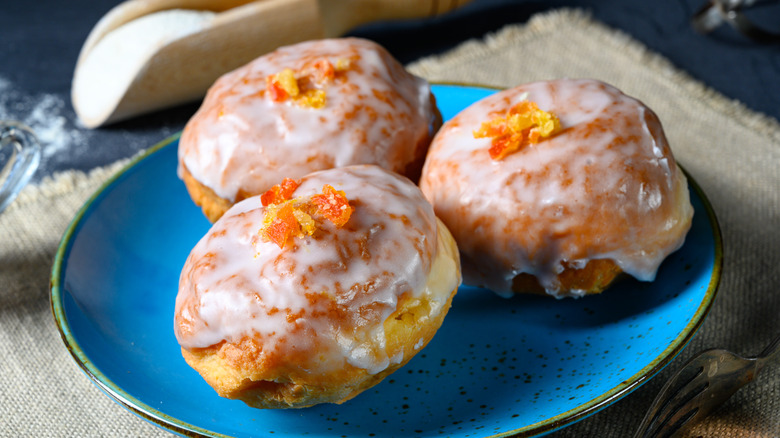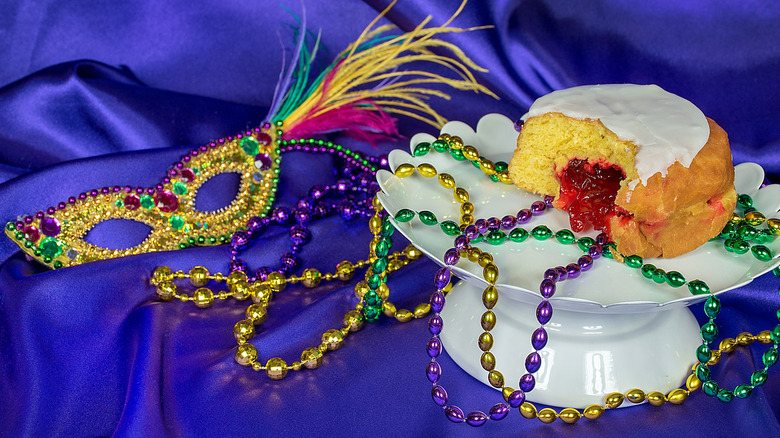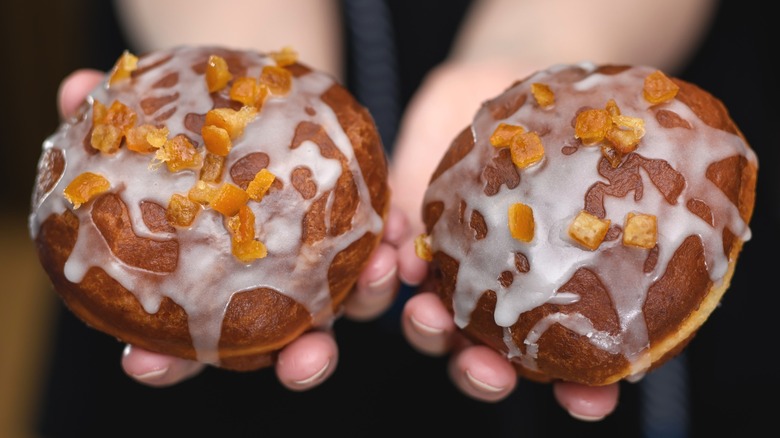Why Paczki Donuts Are A Mardi Gras Must-Have
There are a number of sweet treats associated with the annual celebration of Mardi Gras. These include the donut-like French beignets, which have become synonymous with the city of New Orleans; the king cake, which is baked with a little doll inside representing baby Jesus; and the Mexican and Latin American Rosca De Reyes in honor of the Bible's three wise men or magi, which is a cross between a cake and bread and has a similar religious effigy placed inside of it.
Another scrumptious donut-style dessert associated with the holiday is the paczki. Originating in Poland, they are now commonly enjoyed during the Mardi Gras season throughout the Midwest, especially in cities with large Polish communities, such as Chicago and Detroit. While in the U.S., Paczki Day falls on the same day as Mardi Gras' Fat Tuesday, aka, Carnival — in Poland, it comes a week earlier on Fat Thursday (Tłusty Czwartek in Polish).
The ingredients used to make paczki relate directly to when and why they are eaten. Traditionally, the confection is prepared in the days leading up to the Catholic observance of Lent, which begins on Ash Wednesday. During the 40 days of Lent, adherents abstain from certain foods, so a number of these are what go into paczki in order to use them up rather than have them go to waste. Namely, these include sugar, milk, butter, and eggs, as well as lard, which is used for frying the paczki to a crispy-on-the-outside golden finish.
Traditional and modern fillings in paczki donuts
Paczki are essentially donuts, in that they are deep-fried dough with a familiar round shape and usually stuffed with sweet fillings. They differ from standard American-style cake donuts, however, in that they do not have a hole in the middle and are made with enriched yeasted dough, which results in a rich, chewy texture comparable to French buttery brioche bread, only with less of a crumble.
Authentic paczki ingredients also include a touch of Spirytus, a Polish vodka that is infamous for being the world's strongest alcohol. The grain alcohol not only adds flavor (sometimes it's substituted with rum) but also serves the purpose of keeping the dough from absorbing too much oil and ending up overly greasy.
Fillings for paczki are usually a type of fruit jam or curd but can also be made of different types of custards. Customary Polish fillings include rose petal, prune, plum, and raspberry jams, or lemon curd, vanilla cream, and poppyseed. Modern creative takes on the classic paczki are stuffed with more non-traditional yet equally delicious ingredients like Nutella, chocolate custard, sweetened cream cheese, peanut butter and jelly, halva, toffee, and cinnamon apple pie filling. Paczki are usually finished with a sweet glaze of either powdered icing sugar or granulated white sugar and topped with candied orange peel or zest.
The difference between paczki and a sufganiyah
Although similar to Hanukkah sufganiyot, which are enjoyed in Israel and around the world during the Jewish holiday, paczki are not exactly the same. Both are basically jelly donuts but are consumed at different times — Hanukkah is in either November or December and Mardi Gras in February. But it's how they are cooked that's their main distinguishing factor. Paczki are typically deep-fried in lard – pork fat. Since Jews who observe kosher dietary laws do not consume pork, sufganiyot are fried in chicken fat (schmaltz) or vegetable oil.
Making paczki requires time for multiple yeast risings, culinary skills in order to properly fill them, and some caution to safely fry them. Thankfully, at least for those in Chicago and Detroit or with access to a Polish bakery, paczki are very popular and in demand around Mardi Gras and can often be found sold individually or by the dozen. Paczki Day is celebrated in many Polish-American communities, and it's not unusual to see people lined up at bakeries, restaurants, and delis in order to acquire some of the beloved donuts.
If you're near Hamtramck, Michigan in February, you can take part in the annual Paczki Day festival and 5K Run. The event draws crowds eager to devour and then make room for more of the fried dough — where it's celebrated with a parade and live music at bars and venues throughout the city, along with, of course, lots and lots of paczki.



